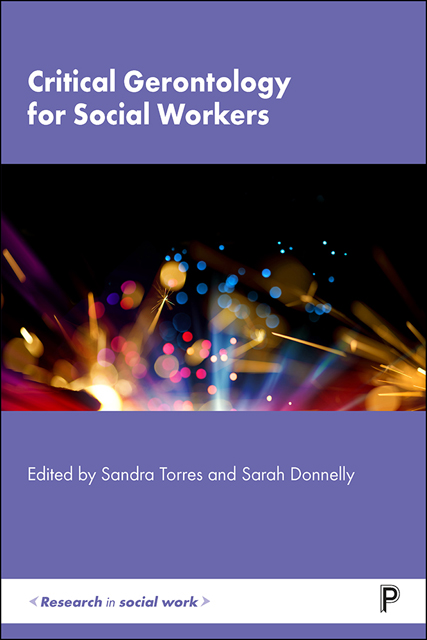Book contents
- Frontmatter
- Contents
- List of figures and tables
- Notes on contributors
- Acknowledgements
- Preface
- 1 Social work and critical gerontology: why the former needs the latter
- Part I Critical gerontology as guiding principles for social work with older people
- Part II Applying the critical gerontological lens to social work research, policy and practice
- Index
10 - Dementia: a disability and a human rights concern
Published online by Cambridge University Press: 13 October 2022
- Frontmatter
- Contents
- List of figures and tables
- Notes on contributors
- Acknowledgements
- Preface
- 1 Social work and critical gerontology: why the former needs the latter
- Part I Critical gerontology as guiding principles for social work with older people
- Part II Applying the critical gerontological lens to social work research, policy and practice
- Index
Summary
Dementia is a broad clinical term used to describe a group of illnesses that have common symptoms but different origins. There are hundreds of different types of dementia, but by far the most common is Alzheimer's disease (Winblad et al, 2016). Age is the single strongest risk factor for dementia (WHO, 2019), but some rarer types of dementia, such as frontotemporal dementia, can occur in younger to middle-aged adults (Jefferies and Aggrawal, 2009). Around the world, about 50 million people have dementia, of whom about 10 million live in Europe (WHO, 2019). However, population ageing means that over the next 30 years the numbers of people likely to develop dementia will reach 131 million. The biggest increase will be among people living in low-to middle-income countries, as this is where population ageing is happening fastest (WHO, 2015a). Dementia does not only incur emotional and social costs; its economic cost is very considerable. For example, in 2018 the global cost of dementia was estimated to be circa $1 trillion (ADI, 2015). Accordingly, the magnitude of dementia should not be underestimated.
In this chapter, a critical gerontological lens will be used to help interrogate and better understand several of the challenges and complexities that gerontological social workers face because of dementia and the pivotal position the biomedical model has had in framing dementia since the latter half of the 20th century. The specific aim of this chapter, therefore, is to apply a critical gerontological lens to challenge the dominant discourse and put forward alternate frameworks for broadening the debate on dementia, improving practice and giving agency, choice and control back to the individual and their family members. By applying this lens and framing dementia as a disability and a human rights issue, social workers can help to enhance practice, inform policy and create a more inclusive society for all. Questions to be answered in this chapter will include: (1) how the critical gerontological lens can be used to extend social workers’ understanding of the complexities of dementia; (2) how social workers can help to maximise and support capacity and decision making for people living with dementia; and (3) how they can balance the rights of people living with dementia, and of their family carers, against the backdrop of neoliberal policies that may result in reliance on family members for the individual's home support.
- Type
- Chapter
- Information
- Critical Gerontology for Social Workers , pp. 146 - 160Publisher: Bristol University PressPrint publication year: 2022



